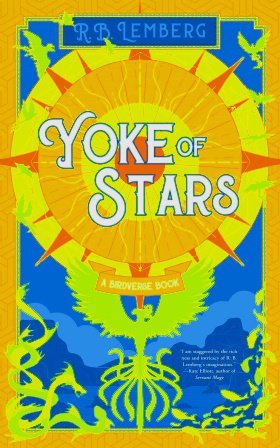Send us souls, the voices continued, souls broken and numb in their grief, souls that are disdained by Bird and others, souls that have no other place to go. The Orphan welcomes them.
I wanted to fling myself deeper into the star’s blazing abyss of soul-embers and nothingness, to dissipate—if I could—to forget—but I stayed, hovering in the darkness, listening to the voices. Some told me their crimes and their stories. Others were silent. For all I had learned about the ways of the body and all the different things that nameway and dreamway people do, death did not mean much here either. It was simply a change of state.
I felt . . . empty, I think. My purpose in the Shoal was to birth, and here, to kill, and all of them meant the same—a transformation into and from the body in the service of a star. It did not matter. Nothing mattered. Hopeloss was ember-fire around my head; my deepnames burned, squeezing and distending me, but I wouldn’t know if the pain was real. The pain was no match to what I felt in my heart.
Some time later, I felt more than saw a trapdoor open in the great distance, above. The meaning of Ladder’s given name revealed itself then, because he spun a rope ladder out of his magic and threw it all the way down to me.
When he pulled me out to the court of sandstone terraces, still in the darkness, he examined my head first of all.
“The Orphan grilled you nice and well,” he began, and I twitched. Was he really—
He noticed my discomfort, and a corner of his mouth lifted up in a cruel smirk. “Be grateful I fished you out.”
I swallowed whatever I was about to say. This was his shoal, and he could do whatever he wanted.
The Headmaster continued, “Matched deepnames—feel them for yourself—you now have two two-syllables.”
In the School of Assassins, we call this configuration of magic the Dirks. Now I was ready to begin the second circle of training.
“So the name you gave me earlier?” Ulín says, and I know she finally understands.
“That is right. I no longer hold the deepname of kah. My single-syllable deepname had been lengthened by the Orphan, so I was in no danger by sharing the old one because it does not exist. What did you think?”
She nods, sadly. “I would never ask for such a secret. But I thought you trusted me.”
I shrug. Not back then. Not completely, even now. But I don’t say it.
Ulín says, “The things you are telling me—aren’t those secrets of this school, of Ladder’s court? Why do you reveal them to me, especially if you don’t trust me?”
“I want to trust you now,” I say, exasperated. “Listen on.”
I was finishing the second circle of training. At this circle, two students would share a room. I was given a room with a pool, and a spare bed intended for someone not siltway, but it was always empty. I had made no friends here—even after I learned the language, nobody wanted to share. I did my first assignments. My tests. Soon I would be ready for the third and last circle and the big assignment—and then, graduation, with it garments of unsullied white made of the magical cloth of bone. Once clad in those garments, I would move all but unseen in the world of nameway and dreamway, accepting assignments on Ladder’s behalf. Or better yet, he would sell my contract to a high-powered person, and I would go out into the world as a guardian to royalty. I doubted anyone would be interested.
“Who wouldn’t want to buy your contract?” Ladder said. “You would bond to this person and flicker to their side when they need you. A priceless skill.”
I did not argue or respond. I did not think I could flicker to Ladder—this was untested after that first time I came to him, vomiting. Even when I was inside the Orphan Star, he extended his ladder to me so that I could emerge. I did not flicker anywhere. The thought of bonding to a new patron filled me with flatness. If ordered, I would attempt it. Maybe.
Those days, the world seemed grainy and thick, like mist. Or like dust, or like sand, or like deepnames, or souls. Some tiny things that go together, clutch each other for warmth, for deliverance, for duty, even for fear. I did as I was told, and when I killed, the souls of my targets went into the Orphan.
Some went willingly into their Star of the Last Resort. Relieved beyond hope that anyone had wanted them. Others had had other desires, but they went anyway. What choice did any of us have? Bird had disdained all of us in the end. She shook the stars from her tail. If she loved us so much to save us, then why did she let us fall?
I was all alone with those thoughts of mine, until one day the round iron gates of the court opened wide—for Ladder to admit a newcomer.

More stubborn even than the stars
Ladder himself stood, as was his custom, in the middle of the roofed greeting space that flanked the gate, his stance wide, and his powerful arms bare. He wore a jacket of old black leather open at the chest, and trousers of leather, and I wondered why it felt like he had dressed up.
What was the occasion? Would-be assassins always came here, bedraggled and starving sometimes, often wounded, woe in their eyes. To come here, they crossed the desert alone, all the changing landscapes of it, the deadly memories of lifetimes never lived, the poisonous creatures, the thirst. If they survived, they came through the gates to see Ladder for the first time. To kneel at his feet. To see his age-changing.

























